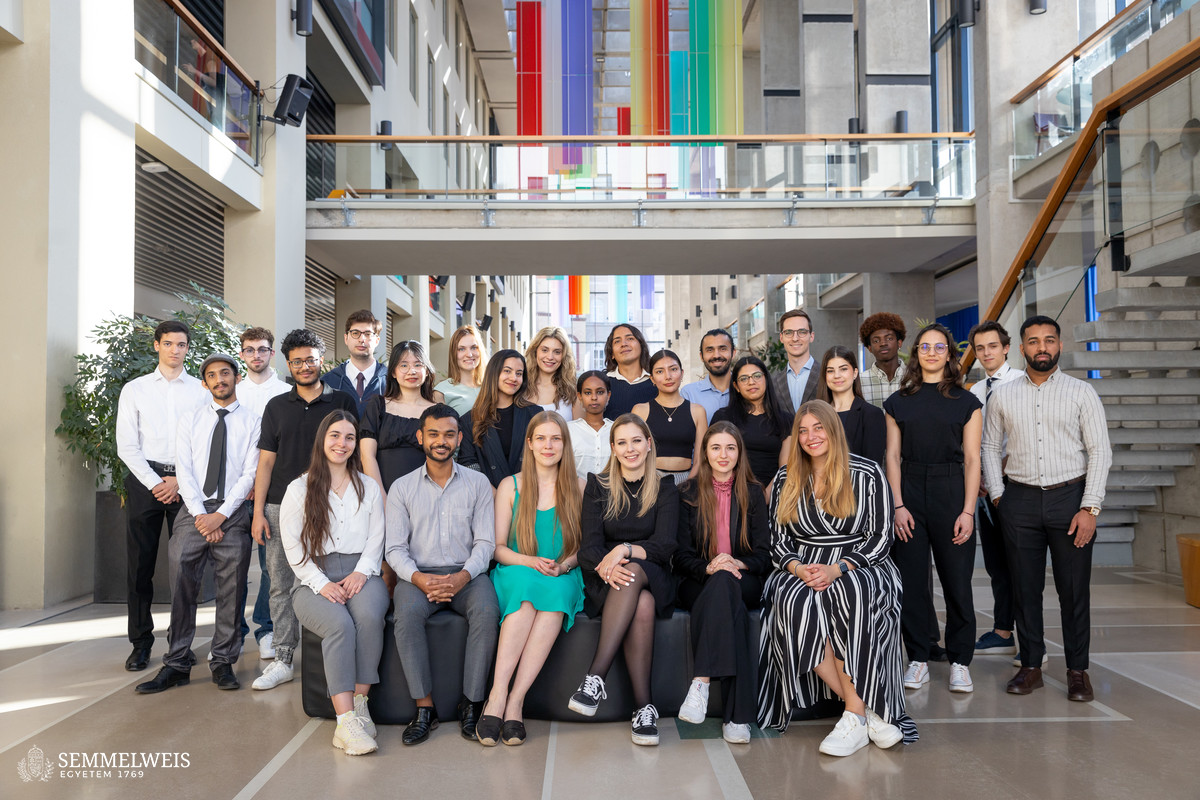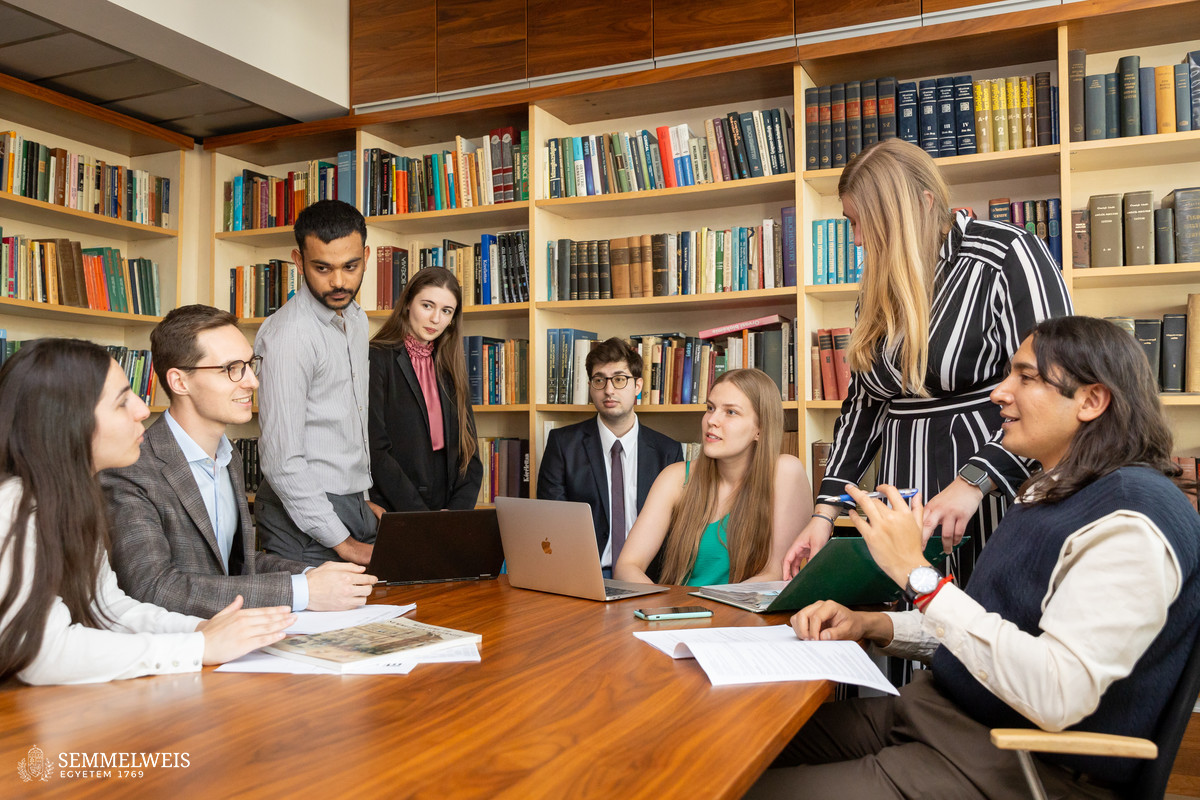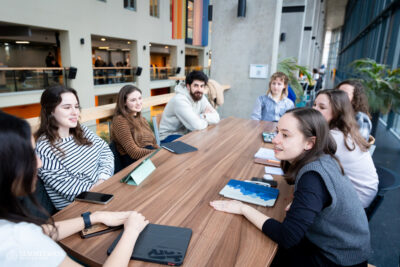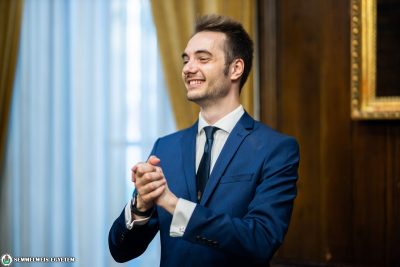Every Monday at 8 p.m., the management team of the International Students’ Committee at the Students’ Union (HÖK) meets online to discuss ongoing projects. Committee officials usually make a tour de table, during which everyone reports on their weekly progress.
What topics are currently on the agenda?
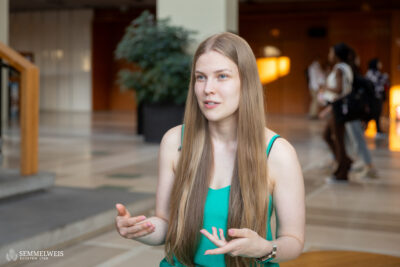 Karina Kovács, Head of the International Students’ Committee: We always have lots of simultaneous projects on our plate. Currently, as we are entering the exam period, our communication team is about to launch a campaign with info posts based on frequently asked questions. Secondly, we strive to strengthen our collaboration with DSVS and ISSA, the associations for our German- and English-language program students. Thirdly, we aim to increase interaction with students from the Faculty of Health Sciences, whose Registrar’s Office and departments are in a different location than those of the Faculties of Medicine, Dentistry, and Pharmaceutical Sciences. We are also in the middle of organizing a sports day and cooking event at one of the dormitories, for which we have recently obtained sports equipment as well.
Karina Kovács, Head of the International Students’ Committee: We always have lots of simultaneous projects on our plate. Currently, as we are entering the exam period, our communication team is about to launch a campaign with info posts based on frequently asked questions. Secondly, we strive to strengthen our collaboration with DSVS and ISSA, the associations for our German- and English-language program students. Thirdly, we aim to increase interaction with students from the Faculty of Health Sciences, whose Registrar’s Office and departments are in a different location than those of the Faculties of Medicine, Dentistry, and Pharmaceutical Sciences. We are also in the middle of organizing a sports day and cooking event at one of the dormitories, for which we have recently obtained sports equipment as well.
Furthermore, we have just surveyed how the system of student representation could be updated; this will be effective from July, the time of the year when newly admitted students reach out to HÖK. But one of the most important items for today is evaluating the first International Campus Tour, which we arranged in collaboration with the Directorate of Student Services (HSzI) for McDaniel College students. Fellow officials who were present will share their experiences and the student feedback received, which might be useful for next year.
What are your experiences regarding the on-site International Campus Tour?
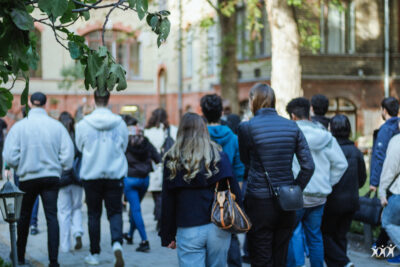
Reem Aladin, Event Coordinator: Although the tour mainly focused on presenting the buildings first- and second-year students will have their classes in, we also gave a brief introduction to the basics of managing student affairs with a bonus anatomy tour, which was amazing. We received many questions, too. Based on student demand, we might schedule an additional Campus Tour for the fall semester.
Mercedes Amy Schulz, Communication Coordinator: This might be easily justified as most English language program students do their pre-medical track in the first semester, whereas German language students prefer the second semester. As a German student studying in the English language program, I consider it my mission to bridge the three language programs. And the first chance for prospective students from different language programs to interact with each other is, indeed, the International Campus Tour.
So, this is the first occasion applicants can get to know Semmelweis University. What about those who are not currently in Budapest?
Mercedes Amy Schulz: Applicants can contact us with exam-related or other questions through direct messages. Should country-specific questions arise, we always manage to find volunteer students from that given country who are willing to share their first-hand experiences. There were a couple of instances last semester when we offered one-on-one campus tours guided by a faculty-student appropriate to where the applicant was coming from. We are currently working on implementing a permanent system for directing such requests received by the university or HÖK to the most appropriate person, thus offering a tour tailored to the given applicant’s needs.
Karina Kovács: Thankfully, our team is quite diverse, with more than 50 members representing almost 30 nationalities.
Muhammad Soban, Deputy Head of Committee, Media Coordinator: Besides that, once the application process is closed, newly admitted students are informed about our instant messaging and social media platforms as well. Currently, we run separate instant messaging groups for each first-year faculty, with a total of 800active members; this allows them to address their questions to the allocated student representatives. We have also prepared step-by-step guides to a range of recurring issues prospective students may encounter, such as applying for documents, residence, tax ID, or health insurance. The ‘Your Semmelweis’ series on our video-sharing platform serves the same purpose.
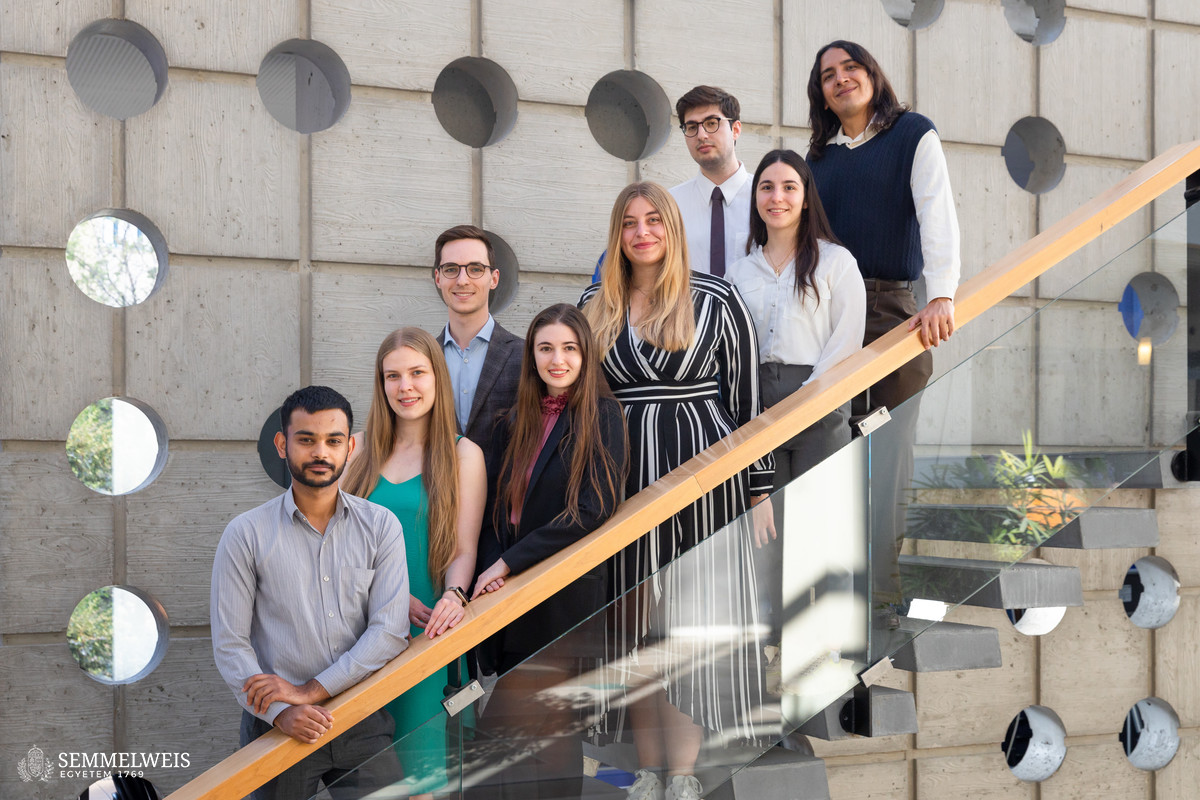
After their first days at Semmelweis, how intensely do students arriving from different countries interact with one another?
Reem Aladin: Quite often, I would say. The Students’ Union is dedicated to fostering a vibrant community life through the numerous events we organize. It all begins with an unforgettable Freshman Camp experience, followed by the International Orientation Day. Both serve as platforms for newly admitted students to forge connections not only amongst themselves but also with us and the university leadership. We place a strong emphasis on inclusivity, ensuring representation from diverse nationalities and faculties in joint events, where various associations are also present. Moreover, networking is facilitated through engaging activities like games, a photo booth, and celebratory parties.
Subsequently, newly admitted students are invited to partake in the Freshman Ball. We are committed to making the start of their academic journey memorable, especially for those who have traveled long distances. Building on the tradition suggested by the Students’ Union, international students have inaugurated the Freshman Ball with a waltz for the third consecutive year. We are thrilled to witness growing participation in all our events, including the Ice Carnival and the Medics’ Cup. Additionally, each year, we eagerly welcome students to the Semmelweis International Carnival, a multicultural food festival where different nationalities showcase their culinary specialties.
As the academic year progresses, interactive events remain popular among international students. First- and second-year students typically favor educational and exam-preparation talks, while upper-year students gravitate towards thesis- and dissertation-oriented events.
Besides university-related events, how would you evaluate your quality of student life?
Nikole Marietha Argyros, Deputy Head of Committee, Faculty Leader Assistant for Medicine: As for the university, I find it brilliant to have a 24-hour library. Sometimes, before a tough exam, you just need that extra 2-hour push to see everyone else studying. I think Budapest is the ultimate place to be a student, both in terms of public security and public transport. Public spaces and parks are popular for having a picnic at Margaret Island with your friends; but I would also highlight the study-friendly cafés around the university which students take advantage of.
How do you operate the committee, considering the multitude and extent of tasks to be performed?
José Orozco, Faculty Leader Assistant for Health Sciences: Our committee is divided into subcommittees dedicated to specific tasks. We undergo training to acquire a wide range of skills. Instead of a ‘team’, I prefer to call our committee a ‘family with multicultural dynamics’. Some weeks could not be more hectic, especially during exam periods or before high-profile events, team buildings, or when coordinating international students at the Faculty of Health Sciences with its seven distinct international programs. A large part of the task is being available 24/7 via our virtual communication channels, which is hard to measure; however, I would estimate my workload to be around 30 hours a month. Of course, this varies depending on how much and in which position the person works. Overall, people work between 5-120 hours.
Mercedes Amy Schulz: As regards work organization, at the beginning of the winter semester, we recruited approximately 70 students to see if any tasks performed by our communications, events, or education representative teams resonate with them. We were giving instructions and at the same time, were trying to have an impression of their readiness to answer urgent questions at 11 p.m., if necessary. Based on that, each member was delegated to a given team to perform duties on demand. As you know, education representatives are allocated to each year’s cohort of each faculty, and their job is to answer questions and take the initiative if they encounter a problem. Should the issue concern the entire cohort, they contact the respective faculty directly.
Muhammad Soban: During our membership recruitment, we try to determine for which tasks the skills of a given applicant are ideal. Following that, we organize onboarding sessions where we share our work process and rules and then we supervise how their first projects are performed. As some of us will graduate next year, we have successfully trained a new group of representatives, who are ready to take over the tasks.
The entire committee is based on the voluntary community engagement of our members, who give an account of the tasks performed at the end of each month. Having plenty of members allows us to balance the workload.
Karina Kovács: Each of our coordinators has their designated teams of around 3 to 10 members, and we also have one to three representatives per faculty per year. However, members also help each other out, making our work scheme rather flexible.
It sounds like everybody brings something to the table.
Muhammad Soban: The Students’ Union unites international and Hungarian students. This proves to be rather beneficial in our communication with the administration and immersing ourselves in Hungarian culture as well.
Karina Kovács: Bringing the three language programs together is also the purpose of our Language Clubs, which offer students an opportunity to learn English, German, or Hungarian for everyday use. Our tutors, trained by the Institute of Languages for Specific Purposes, run nine groups per language with three to five students each, with a curriculum tailored to the needs of the participants, or as our mission statement says, to support students’ needs in every aspect. This is a new project, and we are still fine-tuning it, but it has been a great pleasure for us to start with 120 students. Our ‘biggest concern’ is to broaden our capacity as the courses were three times oversubscribed.
Csenge Gecsey, President of the Students’ Union: Over the past 1.5 years, the International Students’ Committee has made significant strides in improving our services and fostering a sense of community for international students. We are very pleased with the progress made during this time. Whether it is organizing events, providing support, or representing students’ rights, the collaboration between our committees is exceptionally smooth. Recognizing the importance of uniformity in our language programs, we have ensured that all students receive the same services and opportunities.
Thanks to our efforts, international students have successfully integrated into HÖK. Through joint initiatives, team-building activities, and common goals, we have created a friendly environment where everyone feels included.
The work is far from over, as we come up with new ideas every day on how we can support international students even further. We are proud of the results we have achieved so far, and our goal for the future remains that international and Hungarian students will collaborate even better and maintain even closer relationships. Because together we are the Semmelweis Family.
Judit Szabados-Dőtsch
Photos by Boglárka Zellei – Semmelweis University
